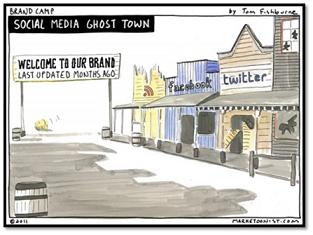You’ve heard the oft-mentioned line a lot in the past year: “Radio is the original social medium.”
 I’m not sure I buy that. In fact, the moves and strategies that have traditionally worked so well in driving ratings often come off as flat and artificial when they’re translated to the social space. Maybe that’s why so many people in radio have struggled with how to best utilize the social media gifts that guys like Mark Zuckerberg have given us.
I’m not sure I buy that. In fact, the moves and strategies that have traditionally worked so well in driving ratings often come off as flat and artificial when they’re translated to the social space. Maybe that’s why so many people in radio have struggled with how to best utilize the social media gifts that guys like Mark Zuckerberg have given us.
At many stations and many companies, there are a lot of random acts of digital occurring, often without a whole lot of strategy or thought. Like the tactic of running incessant promos and teases, many radio stations, programmers, and jocks use social media as simply another dumping ground for sales promotions, giveaways, and other off-key tactics that have nothing to do with why people use sites like Facebook to begin with.
You hear a lot of talk about whether Facebook can effectively help a B2B or B2C business. But the reality is that the essence of social media is P2P. That’s Person To Person, and it speaks to the importance of learning how to communicate effectively on social media. Jim O’Brien of WCSX heard this term recently and it has reinforced what Lori Lewis has been preaching to the radio industry since we hired her earlier this year.
So if radio is at times struggling with the best ways in which to harness social media tools, is there anyone out there doing it right?
That’s what we aimed to find out, and the reason why we launched our “Radio’s Interactive Superstar” competition late last month. We were planning on three finalists, but the quality of the entries signaled us that there was a need to expand the field to five – or “The Fab Five.”
Here’s the list of our finalists, all representing different companies, geographies, formats, and departments in the radio industry:
- Chris Petlak, Social Media Manager – WTMX/Chicago (Hubbard)
- Mark Hamilton, PD/Station Manager – KNRK/Portland (Entercom)
- Maria More, Midday host – WHTA/Atlanta (Radio One)
- Russ Francis, Director/Social Networking – Kidd Kraddick/Yea! Networks
- Jim O’Brien, Producer, Ken Calvert Show – WCSX/Detroit (Greater Media)
 Check out their work here and vote to select a winner. That person will join us in December for Jacobs Media’s 16th Summit, in partnership with the Arbitron Client Conference in Baltimore. More than 3,500 people have voted at the time I wrote this post and you have until November 9th to make your choice.
Check out their work here and vote to select a winner. That person will join us in December for Jacobs Media’s 16th Summit, in partnership with the Arbitron Client Conference in Baltimore. More than 3,500 people have voted at the time I wrote this post and you have until November 9th to make your choice.
This tells me that there’s a great deal of interest in social media and that radio is beginning to figure it out. At Summit 16, we will not only have our Radio Interactive Superstar present his or her story, but we will also feature Sean Parker, Director of Digital Media for the NHL’s Washington Capitals, as well as Jim Farley, the VP of News and Programming for Bonneville’s famous WTOP.
As was the case with our Summit agenda last year, providing radio with a full palette of learning about the social and digital space is a major priority for Jacobs Media. We hope to see you there, along with Radio’s Interactive Superstar. This is a great story for our business.
- A 2020 Lesson?It Could All Be Gone In A Flash - April 24, 2025
- How AI Can Give Radio Personalities More…PERSONALITY - April 23, 2025
- Can Radio Afford To Miss The Short Videos Boat? - April 22, 2025




We are now at over 6,000 votes and we’re only 24 hrs. into this. You’re right on when you say [in regards to how many people are voting,] “This tells me that there’s a great deal of interest in social media and that radio is beginning to figure it out.”
Thanks, Lori. Our goal is to break Zoomerang. Seriously, it is great to see the radio industry support some of the best & brightest social media minds, as well as watching each of our finalists motivate their own networks of fans and followers. We are excited about how well this is going, and not surprisingly, how viral it has become.
Just in regards to the headline and its immediate follow up: Radio WAS indeed the first example of electronic social media: phones on the air, dedications, high school reporters etc. The paradigm shift and all the techno advances that have empowered the average Joe have changed all that…but equally important, and most tragic, by its own hands radio has and is doing its best to paint itself out of the picture. A growth industry invests in its assets: people, products and services. A growth industry covets the next generation. Most radio does neither.
Bob thanks for the comments. I view social media as people interacting with each other – not so much with brands (even though that’s where Facebook has gone). I concur that “old school radio” was famous for giving listeners a voice, something that gets bypassed by a “Premium Choice” voicetracking environment. When radio looks at a SWOT analysis of Pandora, satellite radio, and other “new media” competition, some of the basic things it did back in the day were intuitively smarter and more connecctive that what it usually does now. Thanks for saying it.